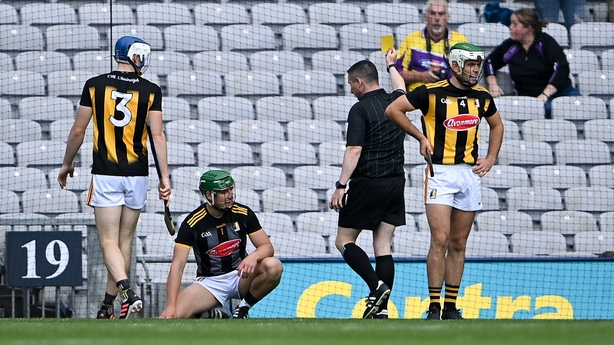Four-time All-Ireland final referee Barry Kelly believes the new rule applied so controversially by James Owens in the LIT Gaelic Grounds on Sunday will be used sparingly for the rest of the season.
On Sunday, Owens awarded a penalty to Tipperary and sin-binned Clare's Aidan McCarthy for a foul on Jake Morris, committed just inside the 21 and tight to the left-hand sideline underneath the Mackey Stand.
The decision left Clare initially confused and then outraged, having a decisive impact on the game. Leading by two points at the time of the incident, Clare were out-scored 2-04 to 0-02 in that 10-minute spell, Jason Forde kicking off the sequence for Tipp by nailing the penalty.
Tipperary went on to win the match by four points and Brian Lohan was furious in his post-match interview and scathing about Owens' judgement.
Kelly, the experienced former Westmeath official, who reffed All-Ireland deciders in 2006, 2008, 2012 and 2014, agrees with most that the penalty call was probably wrong but sympathises with the ref in his grappling with the rule's many "moving parts."
"There's no argument that James got it wrong," Kelly said on the RTÉ GAA podcast
"I spoke at the Westmeath county board meeting in favour of this motion. So, I could be accused of running with the foxes and hunting with the hounds, in a way, because I did vote for it. I do think there needs to be a sanction for cynical play.
"But I do think that there's too many moving parts (to the rule) and James had to consider too many different things. In terms of it being inside the 20, was it a goal-scoring opportunity - not a 'clear' goal-scoring opportunity, that's important, it's a goal-scoring opportunity - and was it cynical.
"I don't think it was cynical. I think McCarthy lunged in instinctively. It wasn't a Sean Cavanagh-type (foul) on McManus a few years ago. He had the ball, gave it to a team-mate, the team-mate lost it, and McCarthy, impetuously, dived in to try and remedy the situation and ended up pulling the guy down."
Listen to the RTÉ GAA Podcast at Apple Podcasts, Soundcloud, Spotify, or wherever you get your podcasts.
Kelly feels the upshot of the controversy is that the rule will be applied judiciously from now on, and possibly only in the most incontestable of circumstances.
"I'd imagine, going forward, it'll only be really blatant goal-scoring attempts that will be penalised. I think referees will be reluctant, or encouraged to be reluctant, that unless it's one-on-one or where everyone watching on television can see 'ah yeah, that's a goal-scoring chance, there' - if it's not one of those, it won't happen.
"That could be a positive from it. I'd predict - and I could be wrong - that this might be a turning point.
"Because this rule is so vague and there's so many interpretations, it could be that at a referees meeting, (someone will say) we can't keep going down this road. We've had about five of these (penalty calls) so far and I would say one of them, the Conall Flood one, was what it was brought in for.
"Other than that, there was one in the Waterford-Clare match, the Tipp-Clare match, the Limerick-Cork one, they're all open to debate now. That's the problem. They can't be open to debate.
"It can be tweaked in its implementation, that's a good way of putting it. I think that's called a euphemism!"
Elsewhere, Kelly extolled the quality of the refereeing at the weekend, especially Fergal Horgan's handling of the Kilkenny-Wexford Leinster semi-final, in which the Tipperary official allowed a more free-flowing contest than had been witnessed at various stages of the Allianz League.

During the league, there was much anxiety about whistle-happy referees, with some referencing again the role of "the assessor" in the stands, long regarded as a nagging, 'kill-joy' influence on the man-in-the-middle.
Kelly says the assessors' reports are far less detailed than they once were and says that experienced referees tend not to be mindful of them.
"Early in your career, you're almost obsessed. You got your assessment back by email and it's a three or four page document - or at least, it was, it's been reduced now - and you could 85 or 86 (percent) and you'd be thrilled. Or else you could get 72 and you'd be in bad humour for a week.
"When you get to a certain level of experience, you're not overly concerned with the assessor or advisor in the stand. Fergal (Horgan) has shown that, Paud O'Dwyer has shown that, Johnny Murphy showed it last Saturday.
"And James Owens, I'm sure, doesn't need an assessor last Sunday. He mightn't even read the report for a while because he probably knows he erred, he got it wrong.
"It is difficult. The rules can be quite vague. Like, careless use of the hurley is a yellow card and striking with the hurley is a red card. Referees quite often trust that the players themselves won't cross the line.
"No one came close to a red card in Kilkenny-Wexford last Saturday. It was fantastic stuff, it was manly stuff for 98-99 minutes. It was enthralling and Fergal handled it superbly."

